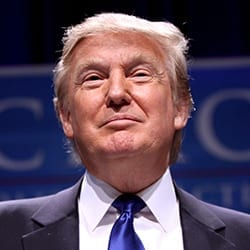Democrats may be working their way through the five stages of grief. So are #NeverTrump Republicans. Foreign policy elites from neoconservatives on the right to liberal internationalist on the left may be in shock. Many foreign governments are no doubt privately aghast. But the truth is that Donald J. Trump — hotel magnate and reality show star — will, on Jan. 20 of next year, become the president of the United States of America. For better or for worse, the foreign policy that he pursues will shape — perhaps decisively — the international strategic and economic landscape for the next four years and even longer.
Trump enters office with no experience in foreign policy, an avalanche of campaign comments that are often incoherent and occasionally contradictory, no discernable allegiance to any particular theory of international relations and a very thin bench of advisors. The advisors he does have – Newt Gingrich, Rudy Giuliani, John Bolton Michael Flynn — suggest an assertive, if largely unilateral, foreign policy, one comfortable with the use of force. We shall know more about Trump’s foreign policy team in the days and months ahead.
All of this makes it hard — very hard — to predict what he will do as president. This uncertainty is deepened by the huge scope for action possessed by any president when it comes to foreign policy. In domestic affairs, presidential initiative is constrained by the budgetary power of Congress, judicial oversight and the independence of bodies like the Federal Reserve. Trump, for instance, will surely find that Republican congressional leaders — notably future Senate Majority Leader Mitch McConnell and House Speaker Paul Ryan — will have domestic agendas that differ from his own. They are far more traditional conservatives than he is.
In contrast, the president’s conduct of foreign policy, though not limitless, is remarkably unconstrained. This is partly constitutional prerogative and partly tradition. When it comes to the awful power of making war, Congress largely defers to the president. There may be criticism on the Hill. It may even be vociferous. But when push comes to shove, Congress has shown little taste for confronting the president over a decision to deploy military force.
In other words, we — and the world — are right to be concerned about a Trump presidency if only for the uncertainty that it engenders.
The Republican primary and general election are littered with Trump pledges (some later hedged) of potentially huge import. He is opposed to the current nuclear deal with Iran. He has called for tariffs against Chinese imports. He wants to renegotiate NAFTA. He is committed to the war against the Islamic State but far less interested in toppling the Assad regime. He wants closer relations with Russia. And he has threatened to reassess our relationship with NATO unless member countries contribute more to defense. If Trump follows through with all these declarations, we would surely witness a sea change in U.S. foreign policy and a substantial remaking of the international order.
Running a campaign, however, is not the same as governing. Rhetoric is not the same as reality; candidates routinely discard campaign promises from practical or political expediency. The world intrudes — bringing competing interests, limited power and painful tradeoffs. Then, of course, are those unexpected shocks — the Sept. 11 attacks, the Arab Spring, the rise of the Islamic State, the Ukrainian crisis — that bedevil every president’s foreign policy. The world resolutely refuses to conform to the priorities of even so powerful a figure as the president of the United States. Trump will be no exception.
Given these imponderables, are there any clues about how Trump will conduct his foreign policy?
Here’s one, tentative as it might be. We should remember that Trump is, at heart, a deal maker. He broke into our national consciousness, after all, with his book, “The Art of the Deal” back in 1987. “The deal” — particularly Trump’s own mastery of it — was a constant refrain in his campaign. His approach seems less driven by ideology or strategy than by a desire to strike a “good deal,” however defined.
One wonders if many of Trump’s pledges are merely what could be thought of as initial bargaining positions in negotiations. The key question, therefore, may not be “What does President Trump want?” but rather “What will he settle for?” Will he, for instance, be satisfied with additional assurances from NATO countries about their military expenditures? Will he walk away with a vague new Chinese promise not to manipulate its currency and call it a victory? Will he sign some modest side agreement with Mexico and Canada and claim that he has renegotiated NAFTA? Such an approach is not without its pitfalls: at some point, a negotiating partner may simply call President Trump’s bluff. Still, as leader of the United States, he will possess vast leverage in any bargaining.
Perhaps this is merely a fairly conventional foreign policy analyst engaging in wishful thinking about the most unconventional president of our lifetimes.
We shall find out.
